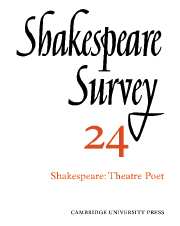Book contents
- Frontmatter
- Hearing Shakespeare: Sound and Meaning in ‘Antony and Cleopatra’
- ‘More Pregnantly Than Words’: Some Uses and Limitations of Visual Symbolism
- Shakespeare and the Limits of Language
- Revenge, Retribution, and Reconciliation
- Shakespeare the Professional
- Shakespeare’s Talking Animals
- The Morality of ‘Love’s Labour’s Lost’
- Shakespeare’s ‘Earth-treading Stars’: the Image of the Masque in ‘Romeo and Juliet’
- ‘Hamlet’ and the ‘Sparing Discoverie’
- ‘Hamlet’ in France 200 Years Ago
- The Hamlet in Henry Adams
- ‘Pericles’ and the Dream of Immortality
- A Necessary Theatre: The Royal Shakespeare Season 1970 Reviewed
- Free Shakespeare
- The Year's Contributions to Shakespearian Study 1 Critical Studies
- 2 Shakespeare’s Life, Times, and Stage
- 3 Textual Studies
- Index
- Plate section
A Necessary Theatre: The Royal Shakespeare Season 1970 Reviewed
Published online by Cambridge University Press: 28 March 2007
- Frontmatter
- Hearing Shakespeare: Sound and Meaning in ‘Antony and Cleopatra’
- ‘More Pregnantly Than Words’: Some Uses and Limitations of Visual Symbolism
- Shakespeare and the Limits of Language
- Revenge, Retribution, and Reconciliation
- Shakespeare the Professional
- Shakespeare’s Talking Animals
- The Morality of ‘Love’s Labour’s Lost’
- Shakespeare’s ‘Earth-treading Stars’: the Image of the Masque in ‘Romeo and Juliet’
- ‘Hamlet’ and the ‘Sparing Discoverie’
- ‘Hamlet’ in France 200 Years Ago
- The Hamlet in Henry Adams
- ‘Pericles’ and the Dream of Immortality
- A Necessary Theatre: The Royal Shakespeare Season 1970 Reviewed
- Free Shakespeare
- The Year's Contributions to Shakespearian Study 1 Critical Studies
- 2 Shakespeare’s Life, Times, and Stage
- 3 Textual Studies
- Index
- Plate section
Summary
In 1970 the Royal Shakespeare Company presented at Stratford new productions of eight plays. Of these The Tempest, directed by John Barton and with Ian Richardson as Prospero, opened too late for review here, and King John and Doctor Faustus were prepared for the touring Theatregoround group, whose requirements are necessarily at occasional odds with those of the Memorial Theatre stage. Such a repertoire is, by any reckoning, ambitious; for the actors mighty gruelling–an extreme test for the company spirit which Peter Hall set out to foster in 1960. The achievement of the sixties was, of course, uneven, but the spectacle of Peter Hall’s bold vision boldly enacted has been a splendour of the British theatre that could be missed only by the impercipient. Trevor Nunn in 1970 must have been uncomfortably aware of the inevitable comparison with Peter Hall in 1960. What are the prospects now? There is a company unique in the British theatre, an audience unique anywhere, and an international reputation which can as well diminish as increase. Above all, after the daring of the previous decade, the conditions are right, for the first time since the Restoration, for the establishment of an English ensemble theatre with a style of its own and an aim in view.
- Type
- Chapter
- Information
- Shakespeare Survey , pp. 117 - 126Publisher: Cambridge University PressPrint publication year: 1971

